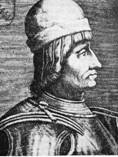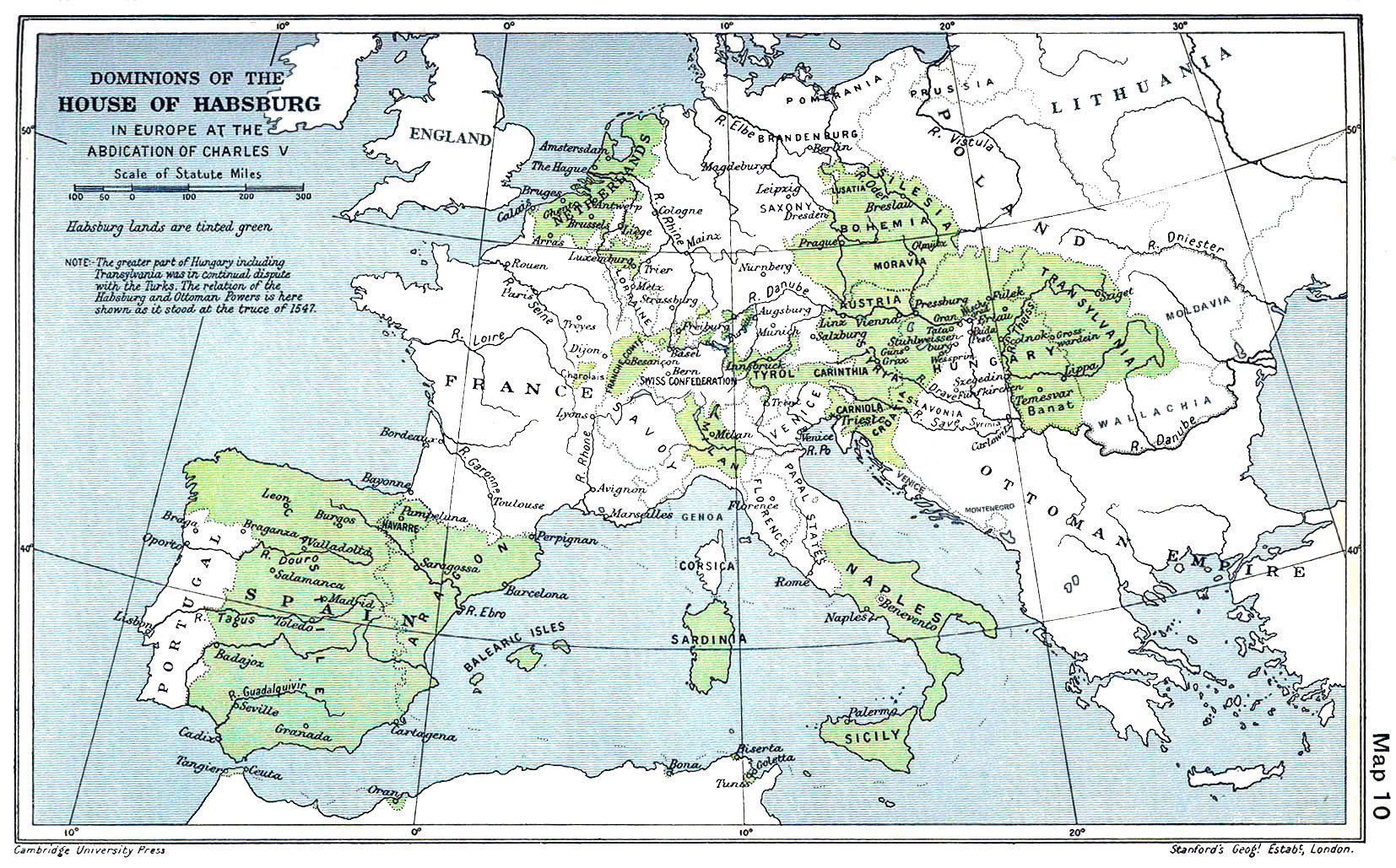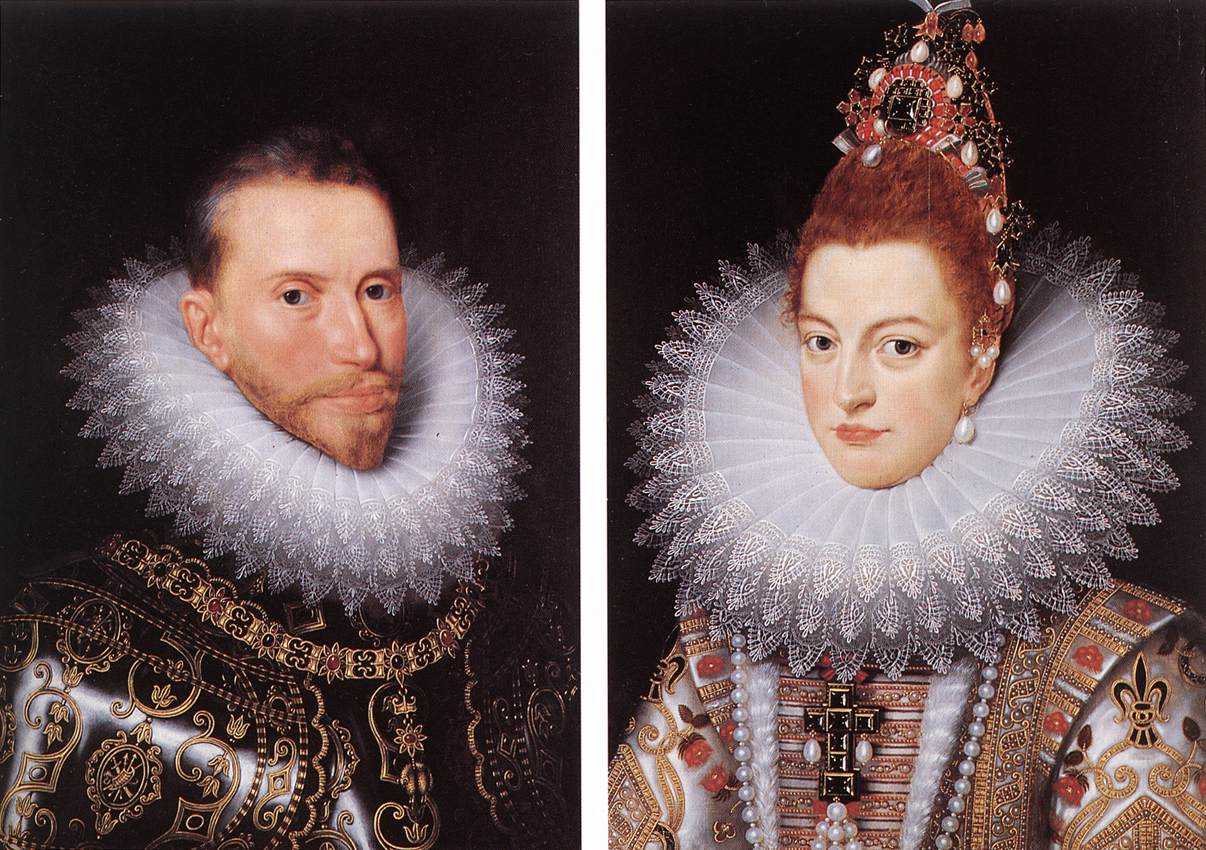|
Guido Bentivoglio D'Aragona
Guido Bentivoglio d'Aragona (4 October 15797 September 1644) was an Italian cardinal, statesman and historian. Early years A member of the Ferrara branch of the influential Bentivoglio family of Bologna, he was the younger son of marchese Cornelio Bentivoglio and Isabella Bendidio. After studying at the universities of Ferrara and Padua, where in 1598 he received a doctorate ''utroque jure''— in both civil and canon law— he returned to Ferrara, to the humanistic studies that honed his elegant writing style. There Pope Clement VIII, on a visit to the city that had recently fallen under direct papal control, made him his private chamberlain, and he returned with Clement to Rome. Nuncio in Brussels and Paris Under Clement's successor, Pope Paul V, he was appointed titular archbishop of Rhodes, 14 May 1607, with a dispensation for being three months shy of the canonical age and not having yet received the sacred orders, in order to give him appropriate credentials as nuncio a ... [...More Info...] [...Related Items...] OR: [Wikipedia] [Google] [Baidu] |
His Eminence
His Eminence (abbreviation H.Em. or HE) is a style (manner of address), style of reference for high nobility, still in use in various religious contexts. Catholicism The style remains in use as the official style or standard form of address in reference to a cardinal (Catholicism), cardinal of the Catholic Church, reflecting his status as a Prince of the Church. A longer, and more formal, title is "His [or Your when addressing the cardinal directly] Most Reverend Eminence". Patriarchs of Eastern Catholic Churches who are also cardinals may be addressed as "His Eminence" or by the style particular to Catholic patriarchs, His Beatitude. When the Grand master (order), Grand Master of the Sovereign Military Order of Malta, the head of state of their sovereign territorial state comprising the island of Malta until 1797, who had already been made a Reichsfürst (i.e., prince of the Holy Roman Empire) in 1607, became (in terms of honorary order of precedence, not in the actual churc ... [...More Info...] [...Related Items...] OR: [Wikipedia] [Google] [Baidu] |
House Of Bentivoglio
The Bentivoglio family (Latin: ''Bentivoius'') was an Italian noble family that became the ''de facto'' rulers of Bologna and responsible for giving the city its political autonomy during the Renaissance, although their rule did not survive a century. History The presence in Bologna of the Bentivoglio family is first recorded in 1323. Originally from the castle of that name in the neighborhood of Bologna, the family claimed descent from Enzio of Sardinia, Enzio, King of Sardinia, an illegitimate son of Frederick II, Holy Roman Emperor. During the fourteenth century, the family, belonging to one of the worker's guilds at Bologna, had gained power as pro-papist Guelphs and Ghibellines, Guelph leaders in the fourteenth century. Amid the faction-conflicts of the commune, on 14 March 1401, Giovanni I Bentivoglio, with the help of Gian Galeazzo Visconti, declared himself '' signore'' and ''Gonfaloniere di Giustizia''. The Visconti however soured on Giovanni, and he was defeated and ki ... [...More Info...] [...Related Items...] OR: [Wikipedia] [Google] [Baidu] |
Dutch Republic
The United Provinces of the Netherlands, commonly referred to in historiography as the Dutch Republic, was a confederation that existed from 1579 until the Batavian Revolution in 1795. It was a predecessor state of the present-day Netherlands and the first independent Dutch people, Dutch nation state. The republic was established after seven Dutch provinces in the Spanish Netherlands Dutch Revolt, revolted against Spanish Empire, Spanish rule, forming a mutual alliance against Spain in 1579 (the Union of Utrecht) and declaring their independence in 1581 (the Act of Abjuration). The seven provinces it comprised were Lordship of Groningen, Groningen (present-day Groningen (province), Groningen), Lordship of Frisia, Frisia (present-day Friesland), Lordship of Overijssel, Overijssel (present-day Overijssel), Duchy of Guelders, Guelders (present-day Gelderland), lordship of Utrecht, Utrecht (present-day Utrecht (province), Utrecht), county of Holland, Holland (present-day North Holla ... [...More Info...] [...Related Items...] OR: [Wikipedia] [Google] [Baidu] |
Southern Netherlands
The Southern Netherlands, also called the Catholic Netherlands, were the parts of the Low Countries belonging to the Holy Roman Empire which were at first largely controlled by Habsburg Spain (Spanish Netherlands, 1556–1714) and later by the Austrian Habsburgs (Austrian Netherlands, 1714–1794) until occupied and annexed by Revolutionary France (1794–1815). The region also included a number of smaller states that were never ruled by Spain or Austria: the Prince-Bishopric of Liège, the Imperial Abbey of Stavelot-Malmedy, the County of Bouillon, the County of Horne and the Princely Abbey of Thorn. The Southern Netherlands comprised most of modern-day Belgium and Luxembourg, small parts of the modern Netherlands and Germany (the Upper Guelders region, as well as the Bitburg area in Germany, then part of Luxembourg), in addition to (until 1678) most of the present Nord-Pas-de-Calais region, and Longwy area in northern France. The (southern) Upper Guelders region consi ... [...More Info...] [...Related Items...] OR: [Wikipedia] [Google] [Baidu] |
Infanta Isabella Clara Eugenia Of Spain
Isabella Clara Eugenia (; 12 August 1566 – 1 December 1633), sometimes referred to as Clara Isabella Eugenia, was sovereign of the Spanish Netherlands, which comprised the Low Countries and the north of modern France, with her husband Archduke Albert VII of Austria. Their reign is considered the Golden Age of the Spanish Netherlands, which saw a revival of its economy and arts after a peace was concluded with the break-away Dutch Republic. Isabella was one of the most powerful women in 16th- and 17th-century Europe. Early life Childhood Isabella Clara Eugenia of Austria was born in the Palace of Valsain, Segovia on 12 August 1566. She was the first surviving daughter of King Philip II of Spain and his third wife, Elisabeth of Valois. Her father was reportedly overjoyed at her birth and declared himself to be happier on the occasion than he would have been at the birth of a son. He already had a male heir, Carlos, Prince of Asturias, but due to the Prince’s men ... [...More Info...] [...Related Items...] OR: [Wikipedia] [Google] [Baidu] |
Archduke Albert Of Austria (1559–1621)
Albert VII (; 13 November 1559 – 13 July 1621) was the ruling Archduke of Austria for a few months in 1619 and, jointly with his wife, Isabella Clara Eugenia, sovereign of the Habsburg Netherlands between 1598 and 1621. Prior to this, he had been a Cardinal (Catholic Church), cardinal, Roman Catholic Archdiocese of Toledo, Archbishop of Toledo, List of viceroys of Portugal, viceroy of Portugal and Governors of the Habsburg Netherlands, Governor General of the Habsburg Netherlands. He succeeded his brother Matthias, Holy Roman Emperor, Matthias as reigning archduke of Archduchy of Austria, Lower and Upper Austria, but abdicated in favor of Ferdinand II, Holy Roman Emperor, Ferdinand II the same year, making it the shortest (and often ignored) reign in Austrian history. Early life Archduke Albert was the fifth son of Maximilian II, Holy Roman Emperor and Maria of Spain, daughter of Charles V, Holy Roman Emperor and Isabella of Portugal. He was sent to the Spanish Court at the a ... [...More Info...] [...Related Items...] OR: [Wikipedia] [Google] [Baidu] |
Nuncio
An apostolic nuncio (; also known as a papal nuncio or simply as a nuncio) is an ecclesiastical diplomat, serving as an envoy or a permanent diplomatic representative of the Holy See to a state or to an international organization. A nuncio is appointed by and represents the Holy See, and is the head of the diplomatic mission, called an apostolic nunciature, which is the equivalent of an embassy. The Holy See is legally distinct from the Vatican City or the Catholic Church. In modern times, a nuncio is usually an Archbishop. An apostolic nuncio is generally equivalent in rank to that of ambassador extraordinary and plenipotentiary, although in Catholic countries the nuncio often ranks above ambassadors in diplomatic protocol. A nuncio performs the same functions as an ambassador and has the same diplomatic privileges. Under the 1961 Vienna Convention on Diplomatic Relations, to which the Holy See is a party, a nuncio is an ambassador like those from any other country. The Vienn ... [...More Info...] [...Related Items...] OR: [Wikipedia] [Google] [Baidu] |
Rhodes
Rhodes (; ) is the largest of the Dodecanese islands of Greece and is their historical capital; it is the List of islands in the Mediterranean#By area, ninth largest island in the Mediterranean Sea. Administratively, the island forms a separate municipality within the Rhodes (regional unit), Rhodes regional unit, which is part of the South Aegean Administrative regions of Greece, administrative region. The principal town of the island and seat of the municipality is the Rhodes (city), city of Rhodes, which had 50,636 inhabitants in 2011. In 2022, the island had a population of 125,113 people. It is located northeast of Crete and southeast of Athens. Rhodes has several nicknames, such as "Island of the Sun" due to its patron sun god Helios, "The Pearl Island", and "The Island of the Knights", named after the Knights Hospitaller, Knights of Saint John of Jerusalem, who ruled the island from 1310 to 1522. Historically, Rhodes was famous for the Colossus of Rhodes, one of the Sev ... [...More Info...] [...Related Items...] OR: [Wikipedia] [Google] [Baidu] |
Archbishop
In Christian denominations, an archbishop is a bishop of higher rank or office. In most cases, such as the Catholic Church, there are many archbishops who either have jurisdiction over an ecclesiastical province in addition to their own archdiocese ( with some exceptions), or are otherwise granted a titular archbishopric. In others, such as the Lutheran Church of Sweden, the title is only borne by the leader of the denomination. Etymology The word ''archbishop'' () comes via the Latin . This in turn comes from the Greek , which has as components the etymons -, meaning 'chief', , 'over', and , 'guardian, watcher'. Early history The earliest appearance of neither the title nor the role can be traced. The title of "metropolitan" was apparently well known by the 4th century, when there are references in the canons of the First Council of Nicæa of 325 and Council of Antioch of 341, though the term seems to be used generally for all higher ranks of bishop, including patriarc ... [...More Info...] [...Related Items...] OR: [Wikipedia] [Google] [Baidu] |
Pope Clement VIII
Pope Clement VIII (; ; 24 February 1536 – 3 March 1605), born Ippolito Aldobrandini, was head of the Catholic Church and ruler of the Papal States from 30 January 1592 to his death in March 1605. Born in Fano, Papal States to a prominent Florence, Florentine family, he initially came to prominence as a canon lawyer before being made a Cardinal-Priest in 1585. In 1592, he was Papal conclave, 1592, elected Pope and took the name of Clement. During his papacy he effected the reconciliation of Henry IV of France to the Catholic faith and was instrumental in setting up an alliance of Christians, Christian nations to oppose the Ottoman Empire in the so-called Long Turkish War, Long War. He also successfully adjudicated in a bitter dispute between the Dominican Order, Dominicans and the Jesuits on the issue of efficacious grace and free will. In 1600, he presided over a jubilee (Christian), jubilee, which brought many pilgrimages to Rome. He presided over the trial and execution ... [...More Info...] [...Related Items...] OR: [Wikipedia] [Google] [Baidu] |
Canon Law
Canon law (from , , a 'straight measuring rod, ruler') is a set of ordinances and regulations made by ecclesiastical jurisdiction, ecclesiastical authority (church leadership) for the government of a Christian organization or church and its members. Canon law includes the internal ecclesiastical law, or operational policy, governing the Catholic Church (both the Latin Church and the Eastern Catholic Churches), the Eastern Orthodox Church, Eastern Orthodox and Oriental Orthodoxy, Oriental Orthodox churches, and the individual national churches within the Anglican Communion. The way that such church law is legislative power, legislated, interpreted and at times court, adjudicated varies widely among these four bodies of churches. In all three traditions, a canon (canon law), canon was originally a rule adopted by a church council; these canons formed the foundation of canon law. Etymology Greek language, Greek / , Arabic language, Arabic / , Hebrew language, Hebrew / , 'straigh ... [...More Info...] [...Related Items...] OR: [Wikipedia] [Google] [Baidu] |
Civil Law (legal System)
Civil law is a legal system rooted in the Roman Empire and was comprehensively codified and disseminated starting in the 19th century, most notably with France's Napoleonic Code (1804) and Germany's (1900). Unlike common law systems, which rely heavily on judicial precedent, civil law systems are characterized by their reliance on legal codes that function as the primary source of law. Today, civil law is the world's most common legal system, practiced in about 150 countries. The civil law system is often contrasted with the common law system, which originated in medieval England. Whereas the civil law takes the form of legal codes, the common law comes from uncodified case law that arises as a result of judicial decisions, recognising prior court decisions as legally binding precedent. Historically, a civil law is the group of legal ideas and systems ultimately derived from the '' Corpus Juris Civilis'', but heavily overlain by Napoleonic, Germanic, canonical, feuda ... [...More Info...] [...Related Items...] OR: [Wikipedia] [Google] [Baidu] |





